Ministers said to cite US president’s dialogue with North Korea’s Kim Jong Un as disturbing precedent, ‘but our capacity to influence and confront Trump is extremely limited’
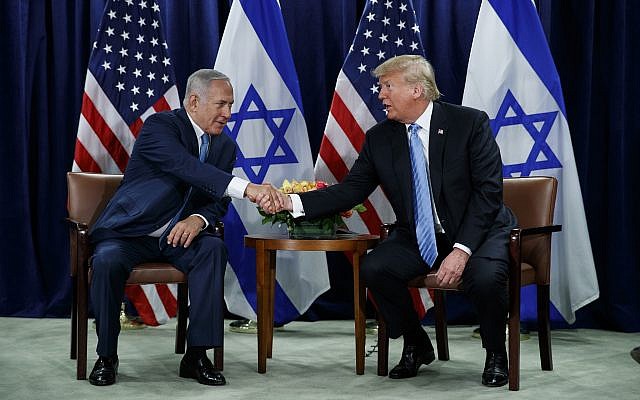
Israel is deeply worried by US President Donald Trump’s declared readiness in principle to meet in the near future with Iranian President Hassan Rouhani, top ministers were quoted saying on Monday evening. The fear is that the US president will open a dialogue with Iran similar to the ongoing one he has with North Korea, taking pressure off Tehran.
To say that Prime Minister Benjamin Netanyahu is uncomfortable with the US president’s newly open-minded stance on Iran “is the understatement of the millennium,” Israel’s Channel 13 reported, quoting what it said were three senior cabinet ministers expressing profound concern that just as Trump has “gotten nowhere” with North Korea, while relieving the economic pressure on Pyongyang, the same would now happen with Iran.
“We have no interest in a negotiations between the United States and Iran,” the TV report quoted one minister saying, “but our capacity to influence and confront Trump is extremely limited.” This, the report went on, was because Trump has “bear-hugged” Netanyahu so tightly that going out against him is deemed impossible.
Netanyahu has been a strident opponent of the P5+1 countries’ 2015 deal with Iran on its rogue nuclear program, arguing that Tehran is intent on attaining a nuclear weapons arsenal, has lied to the world about its plans, and that the 2015 accord actually paves the way to an Iranian bomb. Trump has hitherto adopted a similar stance, and pulled the US out of the accord last year.
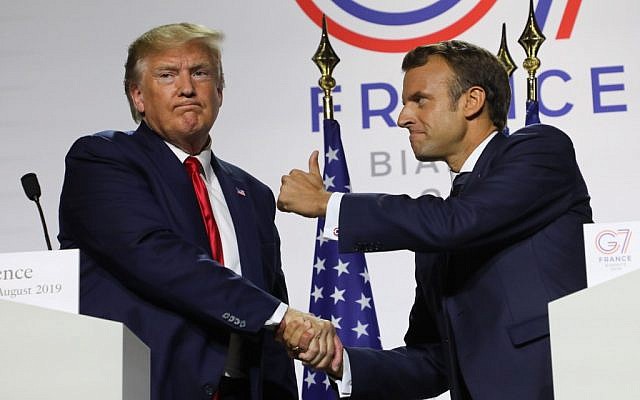
Trump declared Monday at the G7 talks in Biarritz, at a joint press conference with French President Emmanuel Macron, that he would “certainly agree” to meet Rouhani soon under the “correct circumstances,” and that there was a “really good chance” this would happen.
This found an echo in Tehran, where Rouhani said more vaguely that he would not miss an opportunity to meet with someone who could help “the interests of the state” and solve some of its difficulties.
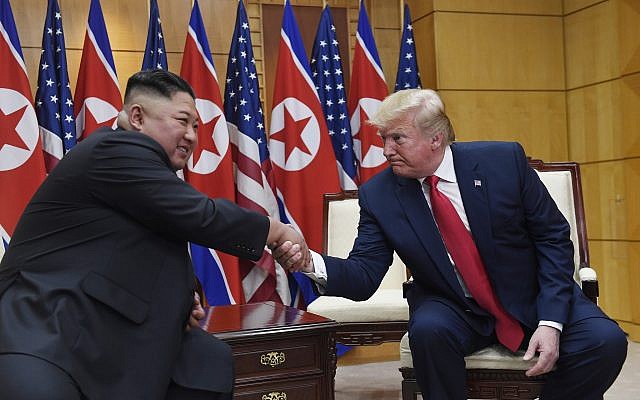
The dramatic change in tone from Washington came as Israel is grappling with soaring tensions relating to Iran, as underlined in a short video clip released by Prime Minister Benjamin Netanyahu on Monday evening in which he fumed that “Iran is acting in a broad front to produce murderous terror attacks against Israel.”
Netanyahu vowed that “Israel will continue to defend its security by any means necessary,” and urged “the international community to act immediately to ensure Iran stops these attacks.”
On Saturday night, Israel preempted what it said was an Iranian plot to send several “killer drones” into Israel from Syria to attack military and civilian targets, and Israel has also allegedly targeted Iranian-linked sites in Iraq and Lebanon in recent days, drawing protests from political leaders in those countries and threats of revenge from the Iranian-backed Hezbollah. The head of the Quds Force of the Iranian Revolutionary Guards Corps, Qassem Soleimani, alleged by Israel to have personally overseen the drone plot, warned Sunday that Israel’s military strikes “will surely be the last steps of the Zionist regime.”
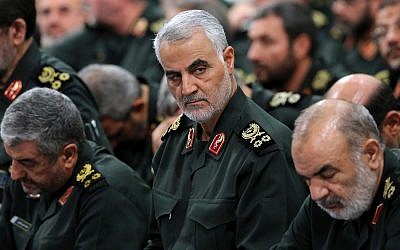
Israel is also grappling with rocket fire from Gaza and ongoing border riots, both orchestrated by the Iranian-backed Hamas and Islamic State terror groups.
Trump’s new conciliatory tone on Iran deals “a critical blow to Netanyahu’s narrative that he and Trump are completely in step on Iran,” Israel’s Channel 12 news noted Monday night, but added that the prime minister could hardly condemn his good friend. It also reported, however, that there was “some interest at the top” of the Israeli political hierarchy in having Trump start renegotiating terms, including on the nuclear deal, with Iran now rather than run the risk of a Democratic presidential victory in 2020 and a subsequent much worse arrangement with Tehran.
The Israeli cabinet has had several discussions about the prospect of US-Iran negotiations, Channel 13 reported, with ministers immensely concerned by the prospect.
It quoted an unnamed Israeli official saying that, “Our great fortune was that, until now, the Iranians refused to speak to Trump.” Macron’s invitation to Iranian Foreign Minister Mohammad Javad Zarif to the G7 summit, and Trump’s readiness to meet with Rouhani, marks “the very moment Israel has worried about,” it said.
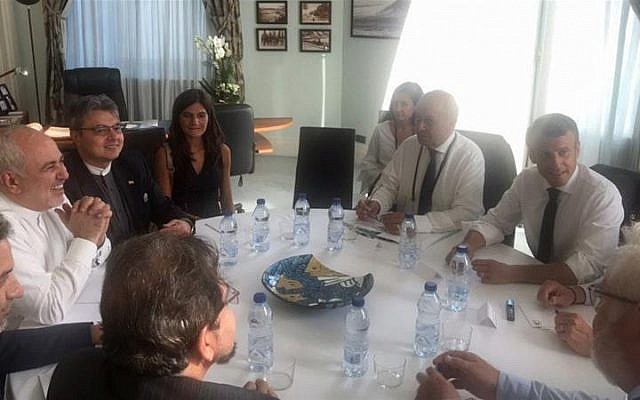
In his remarks in Biarritz, Macron said he was sure that Rouhani would respond positively to an offer of talks from Trump. The US president, for his part, praised Rouhani, saying, “I don’t know the gentleman. I’ll tell you one thing: he’s a great negotiator. I think he’s going to want to meet.”
Trump also indicated he might be open to Iran being offered “a short-term line of credit or loan” to help its economy. “We’re talking about a letter of credit,” he specified. “It would be from numerous countries.” Tehran “may need some money to get over a very rough patch” caused by US economic sanctions, he explained.
Noting that this was the same US president who had castigated then-president Barack Obama for making a “terrible” nuclear deal with Iran and paying Tehran vast sums of money, Channel 13 speculated that a Trump-Rouhani meeting could come as soon as next month, when the two leaders attend the annual UN General Assembly sessions.
It said Israel was pinning its hopes on Trump being deflected from his new course by National Security Adviser John Bolton. Bolton, it said, is “trying to prevent” the new Trump openness to Iran, “and he’s losing.”
Macron and other G-7 leaders opposed Trump’s decision last year to pull the United States out of the 2015 nuclear deal and to impose new sanctions. They have been trying to salvage the treaty ever since. Netanyahu, by contrast, hailed Trump’s decision to withdraw from the deal, and has firmly backed Trump’s policy of “maximum pressure” on Tehran over its nuclear program.
As reported by The Times of Israel
